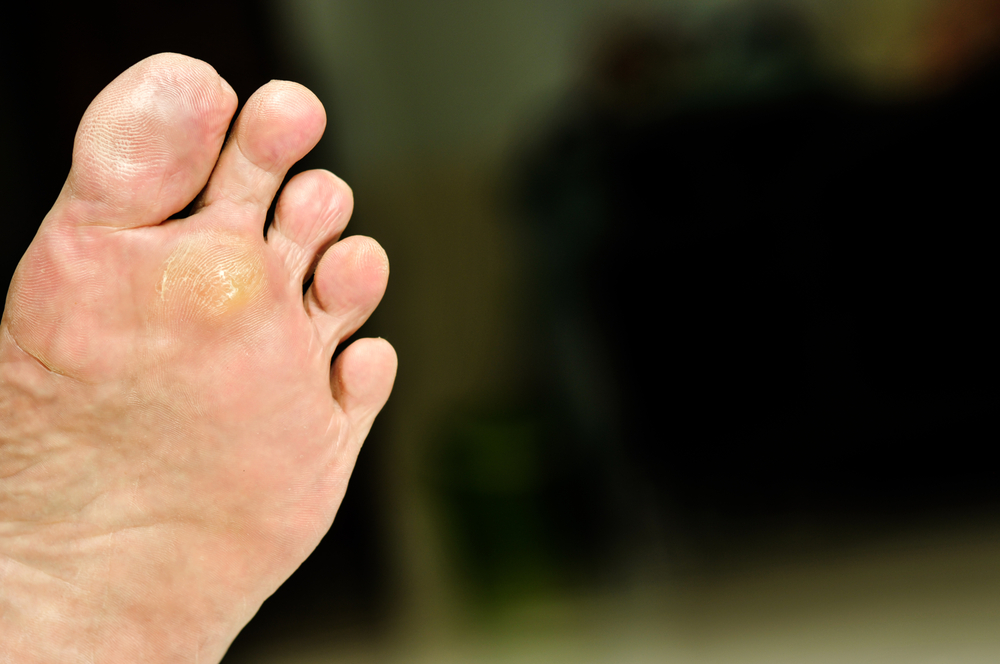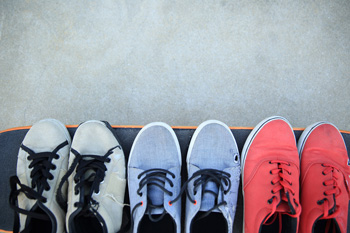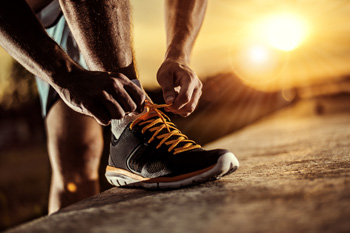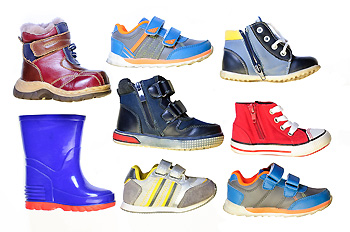Items filtered by date: January 2018
What Causes Plantar Warts?
 A plantar wart is caused by one of many types of a very common virus. It appears as a thick, callused spot on the sole of the foot and may vary in size, ranging from small to possibly covering most of the sole. The human papillomavirus (HPV) that causes plantar warts is known to be contagious and can also spread to other parts of the body. Although anyone is susceptible to this virus, it’s most prevalent in teenagers or those individuals with weakened immune systems. Many of these warts will disappear on their own, making it unnecessary to treat this condition. However, if the wart becomes painful and interferes with daily activities, there are various treatments available. A consultation with a podiatrist is suggested to learn about effective methods designed for the removal of plantar warts.
A plantar wart is caused by one of many types of a very common virus. It appears as a thick, callused spot on the sole of the foot and may vary in size, ranging from small to possibly covering most of the sole. The human papillomavirus (HPV) that causes plantar warts is known to be contagious and can also spread to other parts of the body. Although anyone is susceptible to this virus, it’s most prevalent in teenagers or those individuals with weakened immune systems. Many of these warts will disappear on their own, making it unnecessary to treat this condition. However, if the wart becomes painful and interferes with daily activities, there are various treatments available. A consultation with a podiatrist is suggested to learn about effective methods designed for the removal of plantar warts.
Plantar warts can be very uncomfortable. If you need your feet checked, contact Dr. Ronald Sheppard from Warren-Watchung Podiatry Center. Our doctor will assist you with all of your foot and ankle needs.
About Plantar Warts
Plantar warts are the result of HPV, or human papillomavirus, getting into open wounds on the feet. They are mostly found on the heels or balls of the feet.
While plantar warts are generally harmless, those experiencing excessive pain or those suffering from diabetes or a compromised immune system require immediate medical care. Plantar warts are easily diagnosed, usually through scraping off a bit of rough skin or by getting a biopsy.
Symptoms
- Lesions on the bottom of your feet, usually rough and grainy
- Hard or thick callused spots
- Wart seeds, which are small clotted blood vessels that look like little black spots
- Pain, discomfort, or tenderness of your feet when walking or standing
Treatment
- Freezing
- Electric tool removal
- Laser Treatment
- Topical Creams (prescription only)
- Over-the-counter medications
To help prevent developing plantar warts, avoid walking barefoot over abrasive surfaces that can cause cuts or wounds for HPV to get into. Avoiding direct contact with other warts, as well as not picking or rubbing existing warts, can help prevent the further spread of plantar warts. However, if you think you have developed plantar warts, speak to your podiatrist. He or she can diagnose the warts on your feet and recommend the appropriate treatment options.
If you have any questions please feel free to contact one of our offices located in Marlboro and Watchung, NJ . We offer the newest diagnostic and treatment technologies for all your foot and ankle needs.
How to Choose Shoes That Fit Well
 Several foot conditions may originate from shoes that fit incorrectly. Hammertoes, corns, and bunions are among the ailments that may develop from shoes fitting improperly. Additionally, imbalances involving the body’s muscles may be affected, possibly allowing the knees and hips to become injured. A natural fit occurs when the foot can move freely and is uninhibited by things such as excess material that the shoe may have. When the foot lands on the ground, an ideal fit would allow the foot to expand naturally. Some tips on choosing shoes that fit properly include trying shoes on at the end of the day, when the feet are the largest, and wearing socks that are frequently worn with the shoe. Avoiding carpeted surfaces while trying shoes on is recommended, in addition to taking the time to try running in the shoe to see how it feels.
Several foot conditions may originate from shoes that fit incorrectly. Hammertoes, corns, and bunions are among the ailments that may develop from shoes fitting improperly. Additionally, imbalances involving the body’s muscles may be affected, possibly allowing the knees and hips to become injured. A natural fit occurs when the foot can move freely and is uninhibited by things such as excess material that the shoe may have. When the foot lands on the ground, an ideal fit would allow the foot to expand naturally. Some tips on choosing shoes that fit properly include trying shoes on at the end of the day, when the feet are the largest, and wearing socks that are frequently worn with the shoe. Avoiding carpeted surfaces while trying shoes on is recommended, in addition to taking the time to try running in the shoe to see how it feels.
Finding a properly-fitting shoe is important in reducing injuries and preventing foot problems. For more information about treatment, contact Dr. Ronald Sheppard from Warren-Watchung Podiatry Center. Our doctor will treat your foot and ankle needs.
Proper Shoe Fitting
A common concern when it comes to foot health, having properly fitted shoes can help prevent injuries to the foot. Out feet affect our posture and gait, which in turn affects the biomechanics and overall bodily structure. With 33 joints, 26 bones, and over 100 ligaments, the potential for serious injury is much greater than one realizes. Although the feet cease growth in adulthood, they still change shape as they mature. Here are some factors to consider when it comes to investing in proper fitting shoes:
- Be sure the shoes fit correctly right away
- Ensure the ball of your foot fits comfortably in the widest portion of the shoes
- Even though they may look fashionable, improper fitting shoes can either create adverse conditions or exacerbate existing ones you may already have
- Walk along a carpeted surface to ensure the shoes comfortably fit during normal activity
Keeping in mind how shoes fit the biomechanics of your body, properly-fitting shoes are vitally important. Fortunately, it is not difficult to acquire footwear that fits correctly. Be sure to wear shoes that support the overall structure of your body. Do your feet a favor and invest in several pairs of well-fitted shoes today.
If you have any questions please feel free to contact one of our offices located in Marlboro and Watchung, NJ . We offer the newest diagnostic and treatment technologies for all your foot and ankle needs.
Read more about Proper Shoe FittingCan Exercising Help My Feet?
 Exercises for the feet can be extremely effective in relieving foot pain in addition to preventing possible injuries. Conditions that may benefit from exercise may be plantar fasciitis and Achilles tendonitis. After applying consistent effort, the pain may ease in a few weeks, possibly resulting in much needed relief. An effective stretch for the plantar fascia is to sit while crossing one foot over the knee, pulling the toes back until you feel the muscle stretch. After holding this position for a few seconds, switch to the opposite side. Using a towel that’s wrapped around the ball of your feet while keeping the knees straight and pulling the toes toward the body can be beneficial in stretching the Achilles tendon. Holding this stretch for a few seconds will also stretch out the bottom of the feet. However, before performing any of these stretches speaking with a podiatrist is highly recommended.
Exercises for the feet can be extremely effective in relieving foot pain in addition to preventing possible injuries. Conditions that may benefit from exercise may be plantar fasciitis and Achilles tendonitis. After applying consistent effort, the pain may ease in a few weeks, possibly resulting in much needed relief. An effective stretch for the plantar fascia is to sit while crossing one foot over the knee, pulling the toes back until you feel the muscle stretch. After holding this position for a few seconds, switch to the opposite side. Using a towel that’s wrapped around the ball of your feet while keeping the knees straight and pulling the toes toward the body can be beneficial in stretching the Achilles tendon. Holding this stretch for a few seconds will also stretch out the bottom of the feet. However, before performing any of these stretches speaking with a podiatrist is highly recommended.
Exercising your feet regularly with the proper foot wear is a great way to prevent injuries and build strength. If you have any concerns about your feet, contact Dr. Ronald Sheppard from Warren-Watchung Podiatry Center. Our doctor can provide the care you need to keep you pain-free and on your feet.
Exercise for Your Feet
Exercise for your feet can help you gain strength, mobility and flexibility in your feet. They say that strengthening your feet can be just as rewarding as strengthening another part of the body. Your feet are very important, and we often forget about them in our daily tasks. But it is because of our feet that are we able to get going and do what we need to. For those of us fortunate enough to not have any foot problems, it is an important gesture to take care of them to ensure good health in the long run.
Some foot health exercises can include ankle pumps, tip-toeing, toe rises, lifting off the floor doing reps and sets, and flexing the toes. It is best to speak with Our doctor to determine an appropriate regimen for your needs. Everyone’s needs and bodies are different, and the activities required to maintain strength in the feet vary from individual to individual.
Once you get into a routine of doing regular exercise, you may notice a difference in your feet and how strong they may become.
If you have any questions please feel free to contact one of our offices located in Marlboro and Watchung, NJ . We offer the newest diagnostic and treatment technologies for all your foot and ankle needs.
Measuring Your Child’s Feet
 Children are usually flat-footed when walking first begins, which typically happens around 12 months of age. As the muscles in the foot start to strengthen, this condition commonly disappears. Walking barefoot at this age not only teaches the child to develop balance, it can eliminate the need to buy shoes every few months to accommodate the growing feet. Once the decision is made to buy shoes, it would be beneficial to have the feet professionally measured for length and width to avoid certain problems, such as ingrown toenails. Choosing shoes that have proper heel support and enough room for the toes to fit comfortably is vital for correct foot development. On occasion, the child may exhibit symptoms of certain foot issues, such as toes that are abnormally shaped, stiffness in the foot, or not walking by the age of 2. A consultation with a podiatrist may be helpful if you have concerns about how your child’s feet are developing.
Children are usually flat-footed when walking first begins, which typically happens around 12 months of age. As the muscles in the foot start to strengthen, this condition commonly disappears. Walking barefoot at this age not only teaches the child to develop balance, it can eliminate the need to buy shoes every few months to accommodate the growing feet. Once the decision is made to buy shoes, it would be beneficial to have the feet professionally measured for length and width to avoid certain problems, such as ingrown toenails. Choosing shoes that have proper heel support and enough room for the toes to fit comfortably is vital for correct foot development. On occasion, the child may exhibit symptoms of certain foot issues, such as toes that are abnormally shaped, stiffness in the foot, or not walking by the age of 2. A consultation with a podiatrist may be helpful if you have concerns about how your child’s feet are developing.
Making sure that your children maintain good foot health is very important as they grow. If you have any questions, contact Dr. Ronald Sheppard of Warren-Watchung Podiatry Center. Our doctor can provide the care you need to keep you pain-free and on your feet.
Keeping Children's Feet Healthy
Having healthy feet during childhood can help prevent medical problems later in life, namely in the back and legs. As children grow, their feet require different types of care. Here are some things to consider...
Although babies do not walk yet, it is still very important to take care of their feet.
Avoid putting tight shoes or socks on his or her feet.
Allow the baby to stretch and kick his or her feet to feel comfortable.
As a toddler, kids are now on the move and begin to develop differently. At this age, toddlers are getting a feel for walking, so don’t be alarmed if your toddler is unsteady or ‘walks funny’.
As your child gets older, it is important to teach them how to take care of their feet.
Show them proper hygiene to prevent infections such as fungus.
Be watchful for any pain or injury.
Have all injuries checked by a doctor as soon as possible.
Comfortable, protective shoes should always be worn, especially at play.
If you have any questions please feel free to contact one of our offices located in Marlboro and Watchung, NJ . We offer the newest diagnostic and treatment technologies for all your foot and ankle needs.
Do I Have Hammertoe?
Wearing high heels or shoes that are too tight may lead to hammertoe, which is a painful foot condition resulting from a muscle imbalance in the toes. This causes the ligaments and tendons to become tight and causes the toes to curl. Hammertoe can further possibly lead to conditions such as sores, calluses and corns. Typically the second, third or fourth toe are affected, and wearing lower-heeled shoes can help ease the pain. One can avoid developing a hammertoe by choosing the right pair of shoes for you, ideally where the top of the shoe is wide enough to accommodate the hammertoe. Another option is a toe splint, which can reduce friction and is specifically designed for this condition. Gel toe shields and caps are also recommended to provide comfort and and relieve pain. Please consult a podiatrist for a proper diagnosis and treatment options if the pain persists.
Hammertoe
Hammertoes can be a painful condition to live with. For more information, contact Dr. Ronald Sheppard from Warren-Watchung Podiatry Center. Our doctor will answer any of your foot- and ankle-related questions.
Hammertoe is a foot deformity that affects the joints of the second, third, fourth, or fifth toes of your feet. It is a painful foot condition in which these toes curl and arch up, which can often lead to pain when wearing footwear.
Symptoms
- Pain in the affected toes
- Development of corns or calluses due to friction
- Inflammation
- Redness
- Contracture of the toes
Causes
Genetics – People who are genetically predisposed to hammertoe are often more susceptible
Arthritis – Because arthritis affects the joints in your toes, further deformities stemming from arthritis can occur
Trauma – Direct trauma to the toes could potentially lead to hammertoe
Ill-fitting shoes – Undue pressure on the front of the toes from ill-fitting shoes can potentially lead to the development of hammertoe
Treatment
Orthotics – Custom made inserts can be used to help relieve pressure placed on the toes and therefore relieve some of the pain associated with it
Medications – Oral medications such as anti-inflammatories or NSAIDs could be used to treat the pain and inflammation hammertoes causes. Injections of corticosteroids are also sometimes used
Surgery – In more severe cases where the hammertoes have become more rigid, foot surgery is a potential option
If you have any questions please contact one of our offices located in Marlboro and Watchung, NJ . We offer the newest diagnostic and treatment technologies for all your foot and ankle needs.

